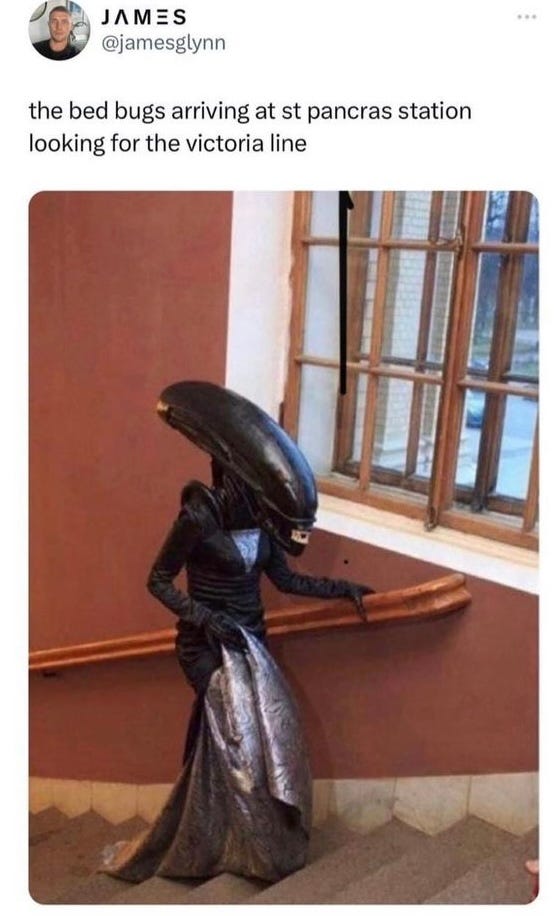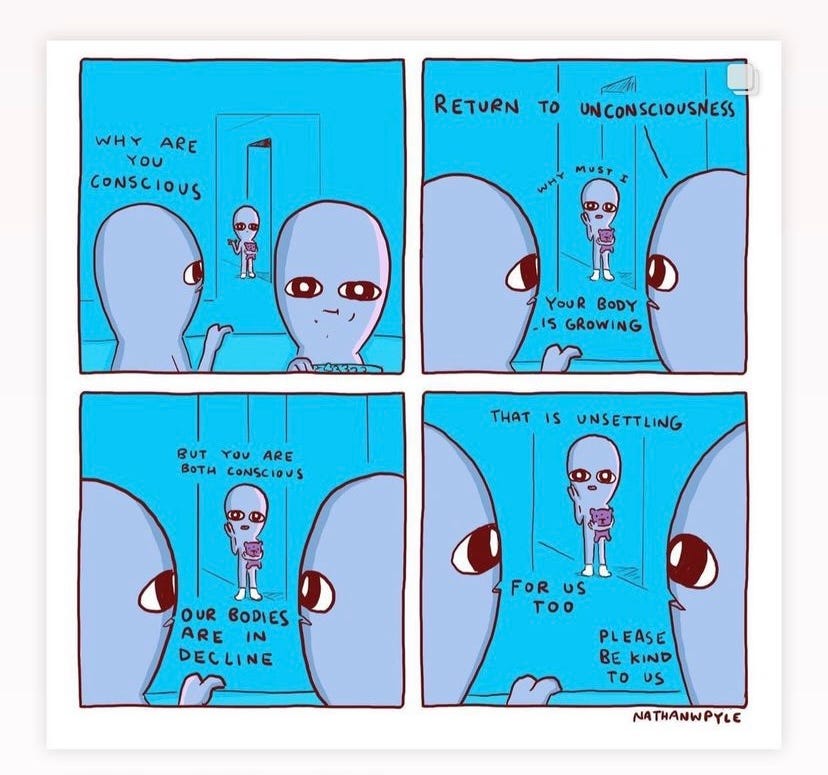First, a schedule change/admission of guilt: realistically, this newsletter will have to be once every two weeks for the next little bit. I have found myself skipping weeks because of being busy or exhausted, so once every two weeks will have to be the new normal at least until the end of the year. Apologies to anyone who was upset not to get A Faster No in your inbox last week! And now, on to our usual nonsense.
As I mentioned in my last newsletter, I’ve been rereading Ben Aaronovitch’s Peter Grant series, which I only read the first four of the first time round. I zoomed through Rivers of London (Midnight Riot in the US), Moon Over Soho, and Whispers Underground, took a brief break to read Dwight Garner’s new memoir The Upstairs Delicatessen, and started Broken Homes on the train this morning.
Peter Grant is a police constable in the Metropolitan Police, a biracial former wannabe architect who discovers in the first novel that he can see ghosts. When this encounter is brought to his superiors, he gets assigned to the supernatural branch of the Met, called the Folly, under the direction of Thomas Nightingale, England’s last sanctioned wizard.
Aaronovitch gives Peter an architect’s eye: this is the first takeaway I would like to highlight. What this means in practice is that when Peter is describing a scene—a murder scene, the home of a suspect, Covent Garden—he starts with the architectural features or history of the area and goes from there. For example:
When my dad was growing up, the city was dotted with bomb sites, gaps in the neat rows of houses where homes had been obliterated. In the postwar years, these sites were gradually cleared and rebuilt as a series of ghastly architectural mistakes. My dad liked to claim that the mistake where I grew up was built on a V2 impact site, but I suspect it was probably just an ordinary cluster of German high explosive dropped by a conventional bomber.
Still, whatever caused the two-hundred-meter gap in the Victoria terraces lining Leighton Road, the postwar planners weren’t going to pass up an opportunity to make mistakes on this scale. Built in the 1950s, the blocks of the Peckwater Estate are six stories high, rectangular and built, as a final aesthetic touch, of a dirty gray brick that weathered badly. As a result, when the clean air act put an end to the famous London pea-soupers and they started sandblasting the old buildings clean, the Peckwater Estate came out looking worse than it had before.
The flats were solidly built, so at least I didn’t grow up listening to next door’s live docusoap, but they were built on the dubious assumption, so beloved of postwar planners, that the London working class was composed entirely of hobbits.
Starting out with describing a place isn’t anything particularly new, but the way Aaronovitch uses this tactic to introduce both his protagonist’s point of view/the things he finds important (detail-oriented, knows a lot about the history of London and architecture) and his voice (dry and funny, with an observer’s wit). Here’s another example:
Sometimes after a hard day’s work nothing will satisfy but a kebab. I stopped at a random Kurdish place on my way through Vauxhall and pulled up on the Albert Embankment to eat it—no kebab in the Jag, that’s the rule. One side of the embankment had suffered from an outbreak of modernism in the 1960s, but I kept my back to their dull concrete facades and instead watched the sun setting fire to the tops of Millbank Tower and the Palace of Westminster. The evening was still warm enough for shirtsleeves, and the city was clinging to summer like a wannabe trophy wife to a promising center forward.
The second takeaway from the series is that the matter-of-fact way Peter describes a scene can, to some readers, feel a bit flat or cold. I would argue that Peter’s matter-of-fact narration is like reading the most hilarious police after-action report imaginable. You can figure out how Peter feels about a situation without him having to come out and say it. At one point, he arrives at a crime scene and asks whether or not a particular detective is the Senior Investigative officer:
“Of course not,” said Stephanopoulis. “We have a DCI on loan from Havering CID but he’s adopted a loose collaborative management approach in which experienced officers undertake a lead role in areas where they have the greatest expertise.” In other words, he’d locked himself in his office and let Stephanopolis get on with it.
Dry approbation of letting Stephanopoulis do her job without interference; equally dry judgment of a detective who doesn’t want to get his hands dirty. Later on that page he describes his own place in the investigation:
The stairs down to the scene were so narrow that we had to wait for a herd of forensics types to come up before we could go down. There’s no such thing as a full-service forensic team. It’s very expensive, so you order bits of it up from the Home Office like a Chinese takeout. Judging b the number of noddy suits filing past us Stephanopoulis had gone for the super-deluxe meal for six with extra egg fried rice. I was, I guessed, the fortune cookie.
I mean! I love it. I love an “I feel” statement as much (or perhaps more, depending on who you ask) as the next editor, but showing in this way is better than all the telling in the land.
The last thing I’d like to point out about the series that makes it feel so real and vibrant is that the cast is incredibly diverse. Peter is biracial; Dr. Walid, their coroner, is a converted Scot; the rivers of London are mostly Black women. The series takes Peter and his team all over London, into every kind of neighborhood. Council estates, tony apartment buildings, converted mews, riverfront cottages, we see every kind of house. We meet every kind of person, too, both human and supernatural: drug dealers, lawyers, fruit-and-veg salesmen, fairies, mole people. Sometimes reading books set in large cities you feel like the author didn’t actually live there, or didn’t know what it was like living in a megalopolis. It’s almost impossible to be completely isolated from people different than you, even in the wealthiest or most homogenous enclave.
Broken Homes was the last book in the series I read, and I’m looking forward to rereading it and getting to the end of the arc set up in Rivers of London in the final three books of the main series. (Who is the Faceless Man? What’s going to happen to Lesley? Will Peter Grant ever find a girlfriend who isn’t a murderous supernatural creature?) I highly recommend this series to anyone who likes urban fantasy, city-as-character, or a plain ol’ ripping yarn.
WHAT I’M READING
Other than Broken Homes, I just finished Dwight Garner’s The Upstairs Delicatessen: On Reading, Eating, Reading About Eating, & Eating While Reading. Garner is a New York Times book critic and when I read his delightful Grub Street Diet in New York Magazine the other week I knew I had to pick up the book. Garner has read seemingly every book in the universe, and brings his considerable memory to bear on the topic of food. Each chapter covers a different topic: breakfast, lunch, shopping, drinking, etc. It’s great fun and a fast read but warning: do not read on an empty stomach.
THIS WEEK IN HOCKEY
My sister and I watched in agony as the score ticked up in the Game 7 of the ALCS finals this week, as the cursed Texas Rangers beat the beloved Houston Astros 11-4. It was horrible. It was painful. All the more insult to injury that it happened at home in the Juice Box in front of two men dressed like astronauts. Still, we had a good run, and as they say—you can’t win ‘em all. Elsewhere the Caps managed to beat the Devils, the Stars got absolutely trounced by the Leafs, and Gritty played an alarming game with some fans at a Flyers game.
HOUSEKEEPING
My first novel, Marrying In, is available for purchase on Kindle, Nook, and Kobo, and is coming soon to iBooks. If you’ve read it, consider leaving a review—that helps me and the book in the long run!
I’m available to hire for freelance editing services on Reedsy. You can find me on social media on Twitter, Instagram, the A Faster No Discord, and now TikTok. If you buy any of the books linked in this newsletter I receive a small commission at no cost to you.



